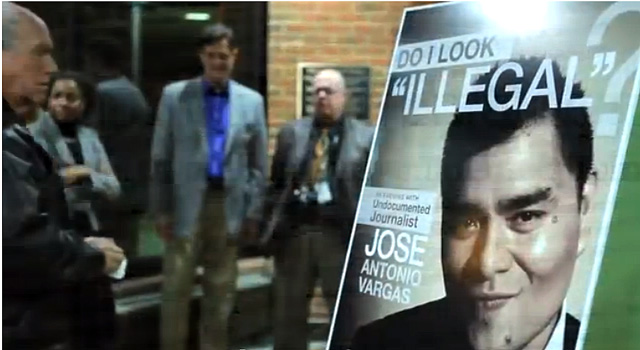By Gabriel Diaz
With the immigration reform on the national agenda, undocumented immigrants have been at the forefront of a new civil rights movement. According to the Pew Research Center, the flow of undocumented immigrants has “stabilized” but there are still 11.2 million residing in the United States.
On February 25th, The Center for Human Rights and Peace Studies, in conjunction with the Leonard Lief Library of Lehman College, hosted a screening of “Documented,” a 2013 documentary by Pulitzer Prize-winning journalist Jose Antonio Vargas, that tells the story of undocumented immigrants who live in the shadows of society.
In 2011, Vargas decided to come out of the shadows himself and declare publicly that he was an undocumented immigrant at great risk to his U.S. status as well as professional life. “Documented” chronicles his journey to America from the Philippines as a child; his journey through America as an immigration reform activist; and his journey inward as he re-connects with his mother, whom he hasn’t seen in person in over 20 years.
Lehman faculty and students were invited to attend the screening, and a brief discussion was held afterwards by Victoria Sanford of The Human Rights and Peace Studies. The panel discussion was diverse, with both citizens and non-citizens of various ethnicities and backgrounds in attendance.

The conversation forced the audience to define what it meant to be American. The theme was set on the idea that undocumented status in the United States amounted to living in a different reality from everyone else; a world spent living a lie as Vargas phrases it. He discovered his status at 16 years old, when he was admonished for using a fake ID at the local DMV. “I lied my way through life,” he said.
With a fake ID and a fake Social Security card, Vargas attended school and eventually started working to support himself. That is where many undocumented people find themselves, fearful of being outed and under the constant threat of deportation. The threats are not unfounded. According to the U.S. Immigration and Customs Enforcement Agency (ICE), 684,587 people were deported in fiscal years 2013 and 2014.
Subsequent to revealing himself as an undocumented immigrant, Vargas began touring the country as an activist, using his professional clout to highlight the importance of immigration reform. One audience member, Dr. Vevekanand Madho, an assistant professor at Lehman College, worried that others might not have the option of exposing their immigration status so easily. “My only gripe is that he was rather brave to come out. It may have been more prudent if he had made his disclosures more discreetly,” he said after the movie.

Another dynamic referenced in the movie was the estrangement of loved ones, with separated families. Without a support system like the one exhibited in the trials of Vargas, it becomes virtually impossible to navigate.
What is rarely discussed is how immigrants, including the undocumented, contribute to the U.S. economy. In 2010, according to the Institute on Taxation and Economic Policy, 11.2 million undocumented immigrants contributed significantly to state and local taxes, collectively paying an estimated $10.6 billion.
Dr. Madho stressed that the differences are minor compared to what immigrants can add. “At times, the main concern/disagreement seems to be the terminology: undocumented vs. illegal. This myopic view eschews the contributions of aliens, documented and/or undocumented, who have made significant contributions to American society. Think of Einstein, Kissinger,” he said.
President Obama has been under constant political pressure to take a hard look at immigration reform from those under his own party, focused on the higher amount of deportations under his watch. “The Obama Administration has deported more people than any previous administration. Political environment should be defined by facts, not feelings,” panel host CUNY Professor Victoria Sanford said.
The term alien is a practice in “othering,” to define the immigration debate as a zero-sum game. As she ended the event, Sanford declared, “We are all Americans.” The discussion is sure to continue, however with the immigration issue sure to be on the top of the national agenda for the foreseeable future.



